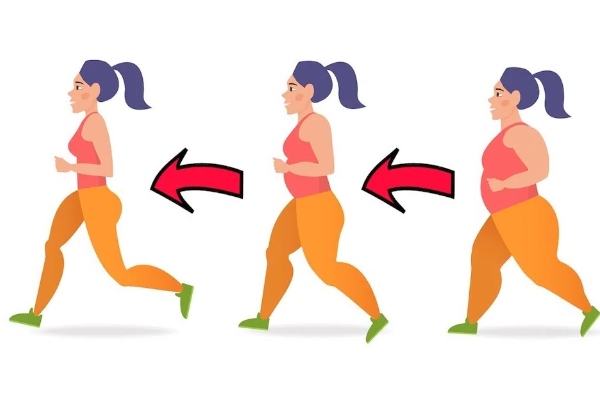Losing weight fast has become a widely sought-after goal, with millions of people eager to shed unwanted pounds quickly for various reasons, whether for health, aesthetics, or an upcoming event. However, the idea of losing weight quickly—especially the ambitious goal of dropping 20 pounds in just 4 weeks—raises important questions about how to achieve this safely and sustainably. While rapid weight loss can seem like a daunting challenge, it is indeed possible when approached with the right strategies and mindset.
Understanding the science behind weight loss is crucial to achieving rapid results. Weight loss essentially occurs when the body burns more calories than it consumes, resulting in a calorie deficit. While a gradual approach is often recommended for long-term weight management, it is possible to lose weight fast with a focused plan that combines proper nutrition, exercise, and lifestyle changes. That said, it’s important to approach rapid weight loss with caution, ensuring that it’s done in a way that doesn’t sacrifice overall health.
Losing 20 pounds in 4 weeks is a significant milestone, but it’s important to note that not everyone can expect the same results. Factors such as age, gender, metabolism, and overall health can influence the rate at which you lose weight. For most people, losing weight too quickly can lead to muscle loss, nutritional deficiencies, and other health risks. However, when executed properly, shedding 20 pounds in 4 weeks can be achieved through a combination of disciplined habits, physical activity, and proper support.
So, how can you lose weight fast in a healthy and sustainable way? In this article, we’ll dive into five essential tips that can help you lose weight quickly while keeping your body nourished and energized. Whether you’re looking to kick-start your fitness journey or you need a boost to reach your target weight, these tips will provide you with actionable steps to accelerate fat loss in just four weeks. Let’s get started!

lose weight fast
Tip #1: Calorie Deficit – The Foundation of Rapid Weight Loss
The cornerstone of losing weight fast is creating a calorie deficit. This means you need to consume fewer calories than your body burns in a day. While it may seem simple, understanding how to do this efficiently and safely is key to achieving sustainable weight loss.
A calorie deficit forces your body to tap into its fat stores for energy, leading to fat loss. According to Dr. David Ludwig, a prominent obesity researcher at Harvard Medical School, “The most effective way to lose weight is to burn more calories than you consume.” This basic principle applies regardless of your diet plan or exercise regimen, making it an essential factor in any weight loss strategy.
To lose 20 pounds in 4 weeks, you’ll need to create a larger calorie deficit than usual, but this must be done in a way that still supports your health. A safe and sustainable deficit is typically around 500 to 1000 calories per day, which can result in a weight loss of 1-2 pounds per week. However, when aiming for more rapid weight loss, you might need to increase the deficit slightly, ensuring it is still manageable for your body.
Here are some practical steps to achieve a calorie deficit without compromising your health:
- Track Your Calories: Use calorie-tracking apps such as MyFitnessPal or Lose It! to keep track of your daily caloric intake. These apps help you become more aware of what you’re eating and ensure that you’re staying within your target deficit range.
- Choose Low-Calorie, High-Nutrient Foods: Opt for foods that are rich in vitamins and minerals but low in calories. Vegetables, lean proteins like chicken or fish, and complex carbs like whole grains are all excellent choices to fill you up without adding too many calories.
- Control Portion Sizes: Even healthy foods can contribute to excess calories if eaten in large portions. Practice mindful eating by paying attention to portion sizes and listening to your body’s hunger cues.
- Avoid Empty Calories: Limit your intake of foods and drinks that provide little nutritional value, such as sugary snacks, processed foods, and alcohol. These foods can easily push you into a caloric surplus without providing the nutrients your body needs to function properly.
Creating a calorie deficit doesn’t have to involve drastic cuts or starvation. In fact, drastically reducing your caloric intake can backfire by slowing down your metabolism. A balanced, moderate deficit allows you to lose weight fast without damaging your health. When combined with exercise and proper hydration, a calorie deficit is the most effective method to accelerate fat loss and achieve your weight loss goals in a healthy manner.
In the next section, we’ll explore how exercise—specifically High-Intensity Interval Training (HIIT)—can complement your calorie deficit and help you lose weight fast.
Tip #2: High-Intensity Interval Training (HIIT) for Accelerated Fat Loss
High-Intensity Interval Training (HIIT) is one of the most effective exercise methods for losing weight fast. HIIT involves short bursts of intense activity followed by brief periods of rest. This method not only burns calories quickly but also boosts metabolism, ensuring continued fat burning even after the workout is over.
One of the primary reasons HIIT works so well is that it maximizes calorie burn in a short period. According to Dr. Michael Mosley, HIIT is a great way to stimulate fat loss because it causes the body to burn fat as fuel, even while at rest. Studies show that HIIT can reduce body fat more effectively than steady-state cardio, making it ideal for those looking to shed pounds quickly.
For beginners, a simple HIIT workout could include exercises like jumping jacks, mountain climbers, and squats, each performed for 30 seconds followed by a 30-second rest. This circuit can be repeated for 3-4 rounds to maximize fat burning in just 20-30 minutes.
Incorporating HIIT into your routine 3-4 times a week, combined with proper nutrition and hydration, will accelerate your weight loss journey. In the next section, we’ll explore how intermittent fasting can further speed up fat loss.

lose weight fast
Tip #3: Incorporating Intermittent Fasting for Weight Loss
Intermittent fasting (IF) has gained popularity as an effective method for losing weight fast by helping to regulate insulin levels and promoting fat burning. By cycling between periods of eating and fasting, the body has time to burn stored fat for energy, which can result in rapid weight loss when combined with a healthy diet and exercise.
There are several types of intermittent fasting schedules that can be implemented, with the most common being the 16/8 method. This involves fasting for 16 hours, then eating during an 8-hour window each day. For example, if you finish your last meal by 8 PM, you wouldn’t eat again until 12 PM the next day. This eating window helps control calorie intake, while the fasting period allows the body to enter a state of fat-burning.
Research has shown that intermittent fasting can also help improve insulin sensitivity, which plays a significant role in weight management. Dr. Jason Fung, a leading expert on intermittent fasting, suggests that reducing the frequency of meals allows the body to process food more efficiently, leading to better overall health and accelerated fat loss.
For a 4-week weight loss plan, starting with a 16/8 intermittent fasting schedule can help you lose weight quickly while maintaining muscle mass. Paired with a calorie deficit and regular exercise, this approach can help you achieve your goal of shedding 20 pounds in just one month. In the next section, we will discuss the importance of hydration and sleep to further enhance your weight loss results.
Tip #4: Importance of Hydration and Sleep in Losing Weight Fast
When aiming to lose weight fast, staying hydrated and getting enough sleep are often overlooked, yet they are crucial factors in the process. Proper hydration supports various metabolic functions, while adequate sleep helps regulate hormones that control hunger and fat storage.
Water is essential for maintaining an optimal metabolic rate, aiding digestion, and flushing out toxins. Often, feelings of hunger are actually signs of dehydration, leading people to eat more than necessary. Drinking water before meals can reduce overall calorie intake and help control appetite. Experts recommend drinking at least 8 glasses (64 ounces) of water daily, but depending on your activity level, you may need more.
Sleep also plays a vital role in weight loss. According to a study by the National Institutes of Health, sleep deprivation can lead to hormonal imbalances, increasing hunger and cravings for high-calorie foods. A lack of sleep also decreases your ability to burn fat efficiently. Aiming for 7–9 hours of sleep each night is essential to allow the body to repair, regenerate, and burn fat during rest.
To support your 4-week weight loss journey, prioritize hydration by carrying a water bottle with you throughout the day, and aim for a consistent sleep schedule. With these habits in place, your metabolism will stay active, and your body will be more efficient in burning fat. Now that we’ve covered hydration and sleep, we’ll wrap up by discussing how to stay committed to your weight loss plan for optimal success.
Conclusion: How to Stay Committed to Your 4-Week Weight Loss Plan
Losing 20 pounds in just 4 weeks is an ambitious goal, but with a clear strategy and unwavering commitment, it is achievable. The key is to combine a healthy calorie deficit with regular exercise, particularly high-intensity interval training (HIIT), while also incorporating intermittent fasting, proper hydration, and sufficient sleep into your daily routine.
Remember, the process is not about drastic, unsustainable measures but about making mindful, effective choices that support long-term health. It’s important to stay patient and focused on your progress rather than rushing for quick results. Maintaining a balanced approach, setting small, achievable milestones, and tracking your progress will keep you motivated.
As you embark on this journey, keep in mind that losing weight is not just about the number on the scale but about feeling stronger, healthier, and more energized. Take the lessons learned from these tips and apply them to build lasting, positive habits. By focusing on both physical and mental well-being, you can achieve lasting results and create a healthier lifestyle that goes beyond just these 4 weeks.

